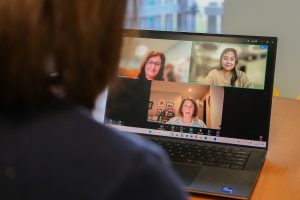Breaking Language Barriers: Training Interpreters for Behavioral Health
When Dilshad Charania immigrated from India 25 years ago, she knew she wanted to use her native language as an asset. After working as a court interpreter for several years, she was introduced to interpreting in the behavioral health setting in 2017. “That was a life changing decision for me because this training was organized [...]
Read More... from Breaking Language Barriers: Training Interpreters for Behavioral Health
Optimizing Care for Patients with Limited English Proficiency
Telehealth can help in connecting patients of all different backgrounds to essential services, but one critical barrier that exists is accessing care for patients with Limited English Proficiency (LEP). Identifying solutions can be challenging but two free and charitable clinics in Richmond have identified ways to get care to these individuals. At CrossOver Healthcare Ministry [...]
Read More... from Optimizing Care for Patients with Limited English Proficiency
Improving Access to Telehealth for Patients with Limited English Proficiency
Telehealth can be challenging for those who aren’t familiar or comfortable with technology, but patients whose first language is not English face another set of barriers. Patients with limited English language proficiency (LEP) are historically less likely to visit the doctor and less likely to get preventative care services, regardless of health status, access to [...]
Read More... from Improving Access to Telehealth for Patients with Limited English Proficiency
In Arlington, Language Barriers No Obstacle for Telehealth
Not just Spanish, but Mongolian is no problemo At first blush, the story is a familiar one. Facing a national health crisis without the ability to see patients in person, a healthcare provider makes the predictable transition to telemedicine, and along the way, discovers that what seemed for a long time like a complicated, pie-in-the-sky [...]
Read More... from In Arlington, Language Barriers No Obstacle for Telehealth
Equity in Telehealth: Addressing Areas in Need
Improving telehealth means ensuring there is equity at every level. Tools, technology and processes must be accessible and customized to meet the needs of all patients. The technology providers use also should offer enhanced options and have translation capabilities for those with a language barrier. Another way physicians can improve telehealth is by digitizing paper [...]
Read More... from Equity in Telehealth: Addressing Areas in Need






